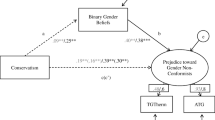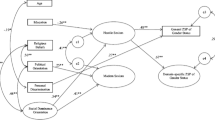Abstract
We tested hypotheses drawn from three theoretical perspectives—gender belief system, authoritarianism, and social dominance—concerning heterosexuals' attitudes toward lesbians and gay men. Data from 122 male and 131 female heterosexual college students with mostly White, middle-class backgrounds indicated that constructs postulated by all three perspectives played important roles in predicting attitudes: Gender differences in attitudes toward lesbians and gay men were mediated by social dominance orientation and gender-role beliefs, indicating that gender role beliefs may act as legitimizing myths to justify antigay attitudes. Authoritarianism had both a direct relationship to attitudes toward lesbians and gay men and an indirect relationship mediated by gender-role beliefs.
Similar content being viewed by others
REFERENCES
Adorno, T. W., Frenkel-Brunswik, E., Levinson, D. J., and Sanford, R. N. (1950). The authoritarian personality. New York: Harper & Row.
Altemeyer, B. (1981). Right-wing authoritarianism. Winnipeg, Canada: University of Manitoba Press.
Altemeyer, B. (1988). Enemies of freedom: Understanding right-wing authoritarianism. San Francisco: Jossey-Bass.
Altemeyer, B. (1996). The authoritarian specter. Cambridge, MA: Harvard University Press.
Altemeyer, B. (1998). The other “authoritarian personality.” Advances in Experimental Social Psychology, 30, 47–92
Berrill, K. T. (1992). Anti-gay violence and victimization in the United States: An overview. In G. M. Herek and K. T. Berrill (Eds.), Hate crimes: Confronting violence against lesbians and gay men (pp. 19–45). Newbury Park, CA: Sage.
Christie, R. (1991). Authoritarianism and related constructs. In J. P. Robinson, P. R. Shaver, and L. S. Wrightsman (Eds.), Measures of personality and social psychological attitudes (pp. 501–572). San Diego, CA: Academic Press.
Cole, D. A. (1987). Utility of confirmatory factor analysis in test validation research. Journal of Consulting and Clinical Psychology, 55, 584–594.
Costrich, N., Feinstein, L., Kidder, L., Marecek, J., and Pascale, L. (1975). When stereotypes hurt: Three studies of penalties for sex-role reversals. Journal of Experimental Social Psychology, 11, 520–530.
D'Augelli, A. R. (1989). Lesbians' and gay men's experiences of discrimination and harassment in a university community. American Journal of Community Psychology, 17, 317–321.
Deaux, K., and Kite, M. E. (1987). Thinking about gender. In B. B. Hess and M. M. Ferree (Eds.), Analyzing gender: A handbook of social science research (pp. 92–117). Newbury Park, CA: Sage.
Deaux, K., and LaFrance, M. (1998). Gender. In D. T. Gilbert, S. T. Fiske, and G. Lindzey (Eds.), The handbook of social psychology (4th ed., Vol. 1, pp. 788–827). Boston, MA: McGraw-Hill.
Deaux, K., and Lewis, L. L. (1984). Structure of gender stereotypes: Interrelationships among components and gender label. Journal of Personality and Social Psychology, 46, 991–1004.
Deaux, K., and Major, B. (1987). Putting gender into context: An interactive model of genderrelated behavior. Psychological Review, 94, 369–389.
Duncan, L. E., Peterson, B. E., and Winter, D. G. (1997). Authoritarianism and gender roles: Toward a psychological analysis of hegemonic relationships. Personality and Social Psychology Bulletin, 23, 41–49.
Eagly, A. H., and Chaiken, S. (1998). Attitude structure and function. In D. T. Gilbert, S. T. Fiske, and G. Lindzey (Eds.), The handbook of social psychology (4th ed., Vol. 1., pp. 269–322). Boston, MA: McGraw-Hill.
Gallup, G., Jr., and Hugick, L. (1990). Racial tolerance grows, progress on equality less evident. Gallup Poll Monthly 1990 (June), 23–32.
Haddock, G., and Zanna, M. P. (1998). Authoritarianism, values, and the favorability and structure of antigay attitudes. In G. M. Herek (Ed.), Stigma and sexual orientation: Understanding prejudice against lesbians, gay men, and bisexuals (pp. 82–107). Thousand Oaks, CA: Sage.
Herek, G. M. (1986). On heterosexual masculinity: Some psychical consequences of the social construction of gender and masculinity. American Behavioral Scientist, 29, 563–577.
Herek, G. M. (1988). Heterosexuals' attitudes toward lesbians and gay men: Correlates and gender differences. Journal of Sex Research, 25, 451–477.
Herek, G. M. (1994). Assessing heterosexuals' attitudes toward lesbians and gay men: A review of research with the ATGL scale. In B. Greene and G. M. Herek (Eds.), Lesbian and gay psychology: Theory, research, and clinical applications (pp. 206–228). Thousand Oaks, CA: Sage.
Jackson, L. A., and Cash, T. F. (1985). Components of gender stereotypes: Their implicationsfor inferences on stereotypic and nonstereotypic dimensions. Personality and Social Psychology Bulletin, 11, 326–344.
Kite, M. E., and Deaux, K. (1987). Gender belief systems: Homosexuality and implicit inversion theory. Psychology of Women Quarterly, 11, 83–96.
Kite, M. E., and Whitley, B. E., Jr. (1996). Sex differences in attitudes toward homosexual persons, behaviors, and civil rights: A meta-analysis. Personality and Social Psychology Bulletin, 22, 336–353.
Kite, M. E., and Whitley, B. E., Jr. (1998). Do heterosexual women and men differ in their attitudes toward homosexuality? A conceptual and methodological analysis. In G. M. Herek (Ed.), Stigma and sexual orientation: Understanding prejudice against lesbians, gay men, and bisexuals (pp. 39–61). Thousand Oaks, CA: Sage.
Kristiansen, C. M., and Hotte, A. M. (1996). Morality and the self: Implications for the when and how of value-attitude-behavior relations. In C. Seligman, J. M. Olson, and M. P. Zanna (Eds.), The psychology of values (pp. 77–105). Mahwah, NJ: Erlbaum.
LaMar, L., and Kite, M. E. (1998). Sex differences in attitudes toward lesbians and gay men: A multidimensional perspective. Journal of Sex Research, 35, 189–196.
Laner, M. R., and Laner, R. H. (1979). Personal style or sexual preference: Why gay men are disliked. International Review of Modern Sociology, 9, 215–228.
Laner, M. R., and Laner, R. H. (1980). Sexual preference or personal style? Why lesbians are disliked. Journal of Homosexuality, 5(4), 339–356.
Martin, C. L. (1990). Attitudes and expectations about children with nontraditional and traditional gender roles. Sex Roles, 22, 151–165.
McCreary, D. R. (1994). The male role and avoiding femininity. Sex Roles, 31, 517–531.
McFarland, S. G., and Adelson, S. (1996, July). An omnibus study of individual differences and prejudice. Paper presented at the meeting of the International Society for Political Psychology, Vancouver, Canada.
McFarland, S. G., and Adelson, S. (1997, July). Toward a typology of prejudiced persons. Paper presented at the meeting of the International Society for Political Psychology, Montreal, Canada.
Pratto, F. (1996). Sexual politics: The gender gap in the bedroom, the cupboard, and the cabinet. In D. M. Buss and N. M. Malamuth (Eds.), Sex, power, and conflict: Evolutionary and feminist perspectives (pp. 179–230). New York: Oxford University Press.
Pratto, F. (1999). The puzzle of continuing group inequality: Putting together psychological, social, and cultural forces in social dominance theory. Advances in Experimental Social Psychology, 31, 191–263.
Pratto, F., Sidanius, J., Stallworth, L. M., and Malle, B. F. (1994). Social dominance orientation: A personality variable predicting social and political attitudes. Journal of Personality and Social Psychology, 67, 741–763.
Pratto, F., Stallworth, L. M., and Conway-Lanz, S. (1998). Social dominance orientation and the ideological legitimization of social policy. Journal of Applied Social Psychology, 28, 1853–1875.
Pratto, F., Stallworth, L. M., and Sidanius, J. (1997). The gender gap: Differences in political attitudes and social dominance orientation. British Journal of Social Psychology, 36, 49–68.
Sidanius, J. (1993). The psychology of group conflict and the dynamics of oppression: A social dominance perspective. In S. Iyengar and W. J. McGuire (Eds.), Explorations in political psychology (pp. 183–219). Durham, NC: Duke University Press.
Sidanius, J., and Pratto, F. (1993). The inevitability of oppression and the dynamics of social dominance. In P. M. Sniderman, P. E. Tetlock, and E. G. Carmines (Eds.), Prejudice, politics, and the American dilemma (pp. 171–211). Stanford, CA: Stanford University Press.
Sidanius, J., Pratto, F., and Bobo, L. (1994). Social dominance orientation and the political psychology of gender: A case of invariance? Journal of Personality and Social Psychology, 67, 998–1011.
Spence, J. T., and Hahn, E. D. (1997). The Attitudes Toward Women scale and attitude change in college students. Psychology of Women Quarterly, 21, 17–34.
Spence, J. T., and Helmreich, R. L. (1972). The Attitudes Toward Women Scale: An objective instrument to measure attitudes toward the rights and roles of women in contemporary society. JSAS Catalog of Selected Documents in Psychology, 2, 6. [Ms. no. 153].
Spence, J. T., Helmreich, R., and Stapp. J. (1973). A short version of the Attitudes Toward Women Scale (AWS). Bulletin of the Psychonomic Society, 2, 219–220.
Swim, J. K., Aiken, K. J., Hall, W. S., and Hunter, B. A. (1995). Sexism and racism: Oldfashioned and modern prejudices. Journal of Personality and Social Psychology, 68, 199–214.
Swim, J. K., and Cohen, L. L. (1997). Overt, covert, and subtle sexism. Psychology of Women Quarterly, 21, 103–118.
Taylor, A. (1983). Conceptions of masculinity and femininity as a basis for stereotypes of male and female homosexuals. Journal of Homosexuality, 9, 37–53.
Thompson, E. H., Jr., and Pleck, J. H. (1995). Masculinity ideologies: A review of research instrumentation on men and masculinities. In R. F. Levant and W. S. Pollack (Eds.), A new psychology of men (pp. 129–162). New York: Basic Books.
Tougas, F., Brown, R., Beaton, A. M., and Joly, S. (1995). Neosexism: Plus ca change, plus c'est pareil. Personality and Social Psychology Bulletin, 21, 842–849.
Twenge, J. M. (1997). Attitudes toward women, 1970-1995: A meta-analysis. Psychology of Women Quarterly, 21, 35–51.
Whitley, B. E., Jr. (1998, August). Authoritarianism and social dominance orientation as independent dimensions of prejudice. Paper presented at the annual meeting of the American Psychological Association, San Francisco.
Whitley, B. E., Jr. (1999). Right-wing authoritarianism, social dominance orientation, and prejudice. Journal of Personality and Social Psychology, 77, 126–134.
Whitley, B. E., Jr., and Lee, S. E. (2000). The relationship of authoritarianism and related constructs to attitudes toward homosexuality. Journal of Applied Social Psychology, 30, 144–170.
Whitley, B. E., Jr., and Richardson, A. J. (2000, May). Gender-role variables and attitudes toward homosexuality: A meta-analysis. Paper presented at the annual meeting of the Midwestern Psychological Association, Chicago.
Yang, A. S. (1997). Attitudes toward homosexuality. Public Opinion Quarterly, 61, 477–507.
Author information
Authors and Affiliations
Rights and permissions
About this article
Cite this article
Whitley, B.E., Ægisdóttir, S. The Gender Belief System, Authoritarianism, Social Dominance Orientation, and Heterosexuals' Attitudes Toward Lesbians and Gay Men. Sex Roles 42, 947–967 (2000). https://doi.org/10.1023/A:1007026016001
Issue Date:
DOI: https://doi.org/10.1023/A:1007026016001




